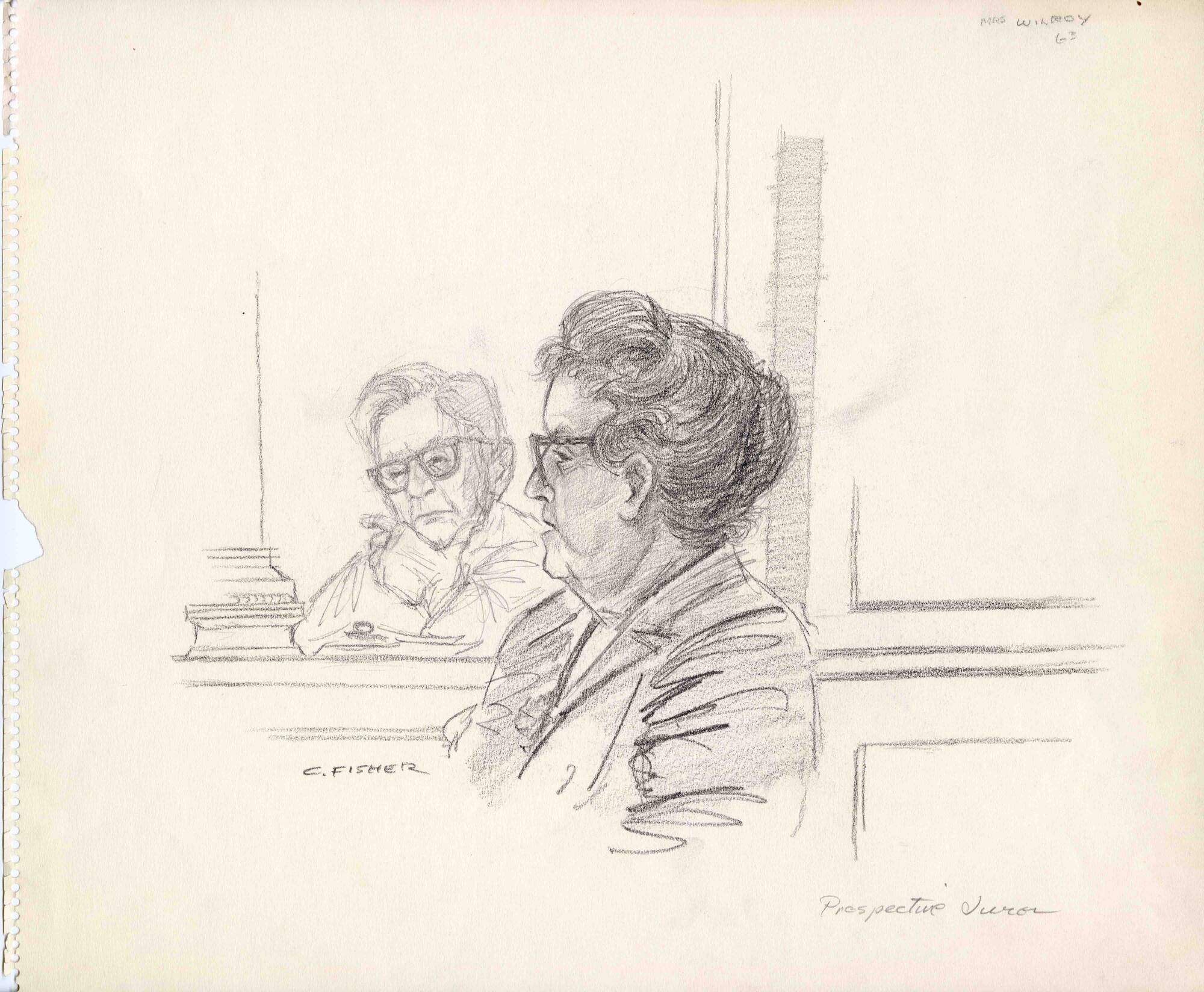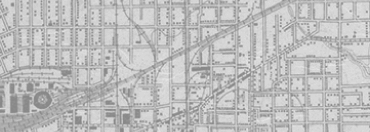


Back
Courtroom sketch of Prospective Juror Mrs. Wilroy for Jack Ruby trial
Courtroom pencil sketch on paper by Charles Fisher. The sketch shows prospective juror Ms. Annie Wilroy during the trial of Jack Ruby on February 26, 1964. The sketch shows Ms. Wilroy seated in front of Judge Joe B. Brown, who has his chin resting in one hand while he looks at her. The caption in the top right reads "Mrs. Wilroy," and in the lower right corner is the caption "Prospective Juror." The artist's signature: "C. Fisher" is at bottom left edge, next to the figure of Mrs. Wilroy. Charles "Chuck" Fisher was the art director at KRLD-TV in 1963. Fisher made the pencil sketches during the trial of Jack Ruby for KRLD-TV after the judge barred cameras from the courtroom.
Courtroom sketch of Prospective Juror Mrs. Wilroy for Jack Ruby trial
02/26/1964
Paper
14 × 17 in. (35.6 × 43.2 cm)
Chuck Fisher Collection/The Sixth Floor Museum at Dealey Plaza
2004.020.0001
Jury selection in the Jack Ruby trial took place between February 17 and March 3, 1964. During that two-week period, 162 prospective jurors were interviewed, which District Attorney Henry Wade informed the news media was not a Dallas County record. Of the 162 individuals interviewed for the Ruby trial, twelve were accepted, eighteen were challenged by the defense team, eleven were challenged by the prosecution, sixty-two were ruled out because they were against the death penalty, fifty-eight were ruled out because they held fixed opinions on the case, and one was excused due to illness. -- Stephen Fagin, Curator
Mrs. Annie Wilroy of Garland, Texas, testified on Wednesday, February 26, 1964. More than a week into jury selection, this was by far the most productive day since three jurors were selected - R.J. Fletchner, Gwen English, and J.G. Holton - out of a total of fourteen interviewed. Mrs. Wilroy was the twelfth prospective juror interviewed that day, immediately after J.G. Holton Jr. had been accepted to the jury. Although confused by several of the questions posed to her, Annie Wilroy seemed like a perfect juror for the Ruby trial, admitting no opinions about Jack Ruby, acknowledging that she would be a "completely fair and impartial Juror to Jack Ruby," and even telling the court that it would not inconvenience her or her family if she were confined as a juror for three or four weeks. District Attorney Henry Wade told Mrs. Wilroy that the State would like to accept her as a juror. However, speaking for the defense, attorney Phil Burleson challenged her. He attempted to disqualify her under Article 616, which prohibits an eyewitness from serving as a juror (since she had seen the Oswald shooting on television). These frequent challenges for cause under this article were consistently overruled by Judge Joe B. Brown. Instead, Burleson challenged her peremptorily, a right in jury selection for the attorneys to reject a certain number of potential jurors without stating a reason. -- Stephen Fagin, Curator

Courtroom sketch of Prospective Juror Mrs. Wilroy for Jack Ruby trial
Courtroom pencil sketch on paper by Charles Fisher. The sketch shows prospective juror Ms. Annie Wilroy during the trial of Jack Ruby on February 26, 1964. The sketch shows Ms. Wilroy seated in front of Judge Joe B. Brown, who has his chin resting in one hand while he looks at her. The caption in the top right reads "Mrs. Wilroy," and in the lower right corner is the caption "Prospective Juror." The artist's signature: "C. Fisher" is at bottom left edge, next to the figure of Mrs. Wilroy. Charles "Chuck" Fisher was the art director at KRLD-TV in 1963. Fisher made the pencil sketches during the trial of Jack Ruby for KRLD-TV after the judge barred cameras from the courtroom.
Courtroom sketch of Prospective Juror Mrs. Wilroy for Jack Ruby trial
02/26/1964
Artist
Sketches
Trials
Jury
Artwork
Jack Ruby trial
Fisher, Charles
KRLD-TV
Dallas
Paper
14 × 17 in. (35.6 × 43.2 cm)
Chuck Fisher Collection/The Sixth Floor Museum at Dealey Plaza
2004.020.0001
Jury selection in the Jack Ruby trial took place between February 17 and March 3, 1964. During that two-week period, 162 prospective jurors were interviewed, which District Attorney Henry Wade informed the news media was not a Dallas County record. Of the 162 individuals interviewed for the Ruby trial, twelve were accepted, eighteen were challenged by the defense team, eleven were challenged by the prosecution, sixty-two were ruled out because they were against the death penalty, fifty-eight were ruled out because they held fixed opinions on the case, and one was excused due to illness. -- Stephen Fagin, Curator
Mrs. Annie Wilroy of Garland, Texas, testified on Wednesday, February 26, 1964. More than a week into jury selection, this was by far the most productive day since three jurors were selected - R.J. Fletchner, Gwen English, and J.G. Holton - out of a total of fourteen interviewed. Mrs. Wilroy was the twelfth prospective juror interviewed that day, immediately after J.G. Holton Jr. had been accepted to the jury. Although confused by several of the questions posed to her, Annie Wilroy seemed like a perfect juror for the Ruby trial, admitting no opinions about Jack Ruby, acknowledging that she would be a "completely fair and impartial Juror to Jack Ruby," and even telling the court that it would not inconvenience her or her family if she were confined as a juror for three or four weeks. District Attorney Henry Wade told Mrs. Wilroy that the State would like to accept her as a juror. However, speaking for the defense, attorney Phil Burleson challenged her. He attempted to disqualify her under Article 616, which prohibits an eyewitness from serving as a juror (since she had seen the Oswald shooting on television). These frequent challenges for cause under this article were consistently overruled by Judge Joe B. Brown. Instead, Burleson challenged her peremptorily, a right in jury selection for the attorneys to reject a certain number of potential jurors without stating a reason. -- Stephen Fagin, Curator









